人教版选修八Unit 4 Pygmalion language focus课件(共31张PPT)
文档属性
| 名称 | 人教版选修八Unit 4 Pygmalion language focus课件(共31张PPT) |

|
|
| 格式 | zip | ||
| 文件大小 | 967.7KB | ||
| 资源类型 | 教案 | ||
| 版本资源 | 人教版(新课程标准) | ||
| 科目 | 英语 | ||
| 更新时间 | 2020-03-11 00:00:00 | ||
图片预览

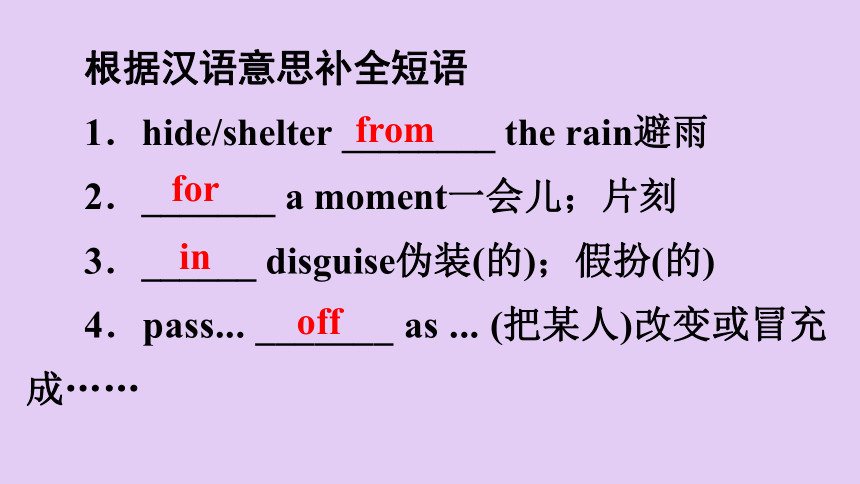
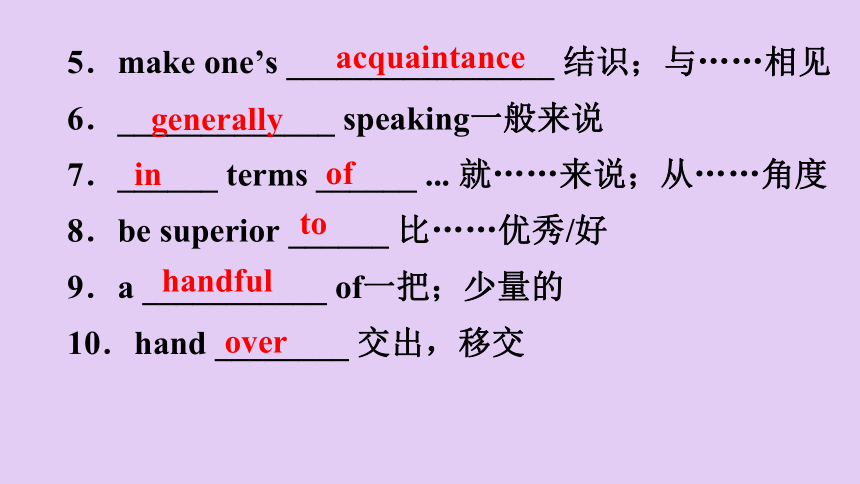
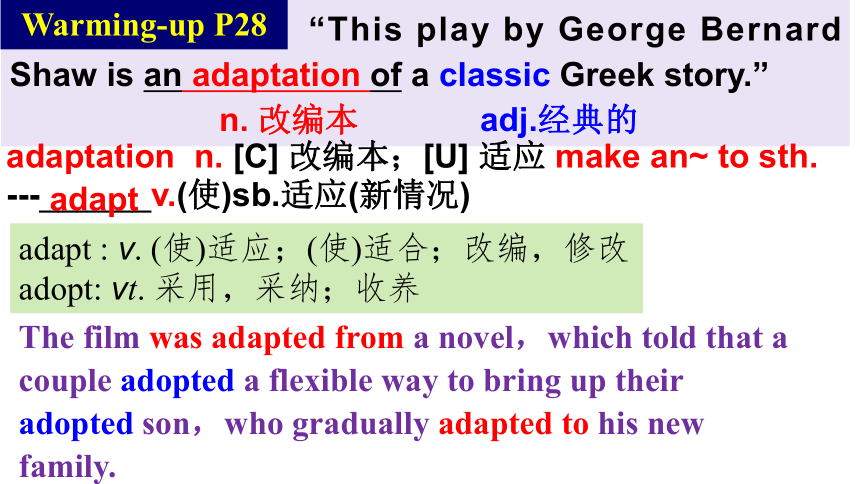
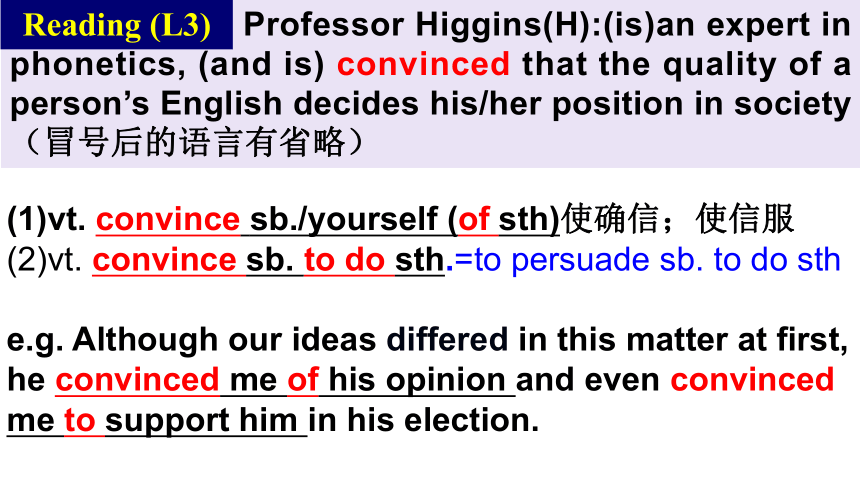
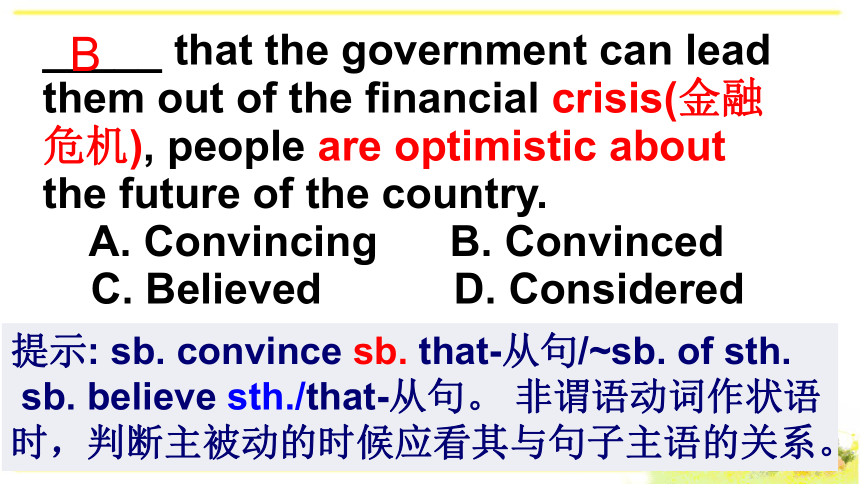

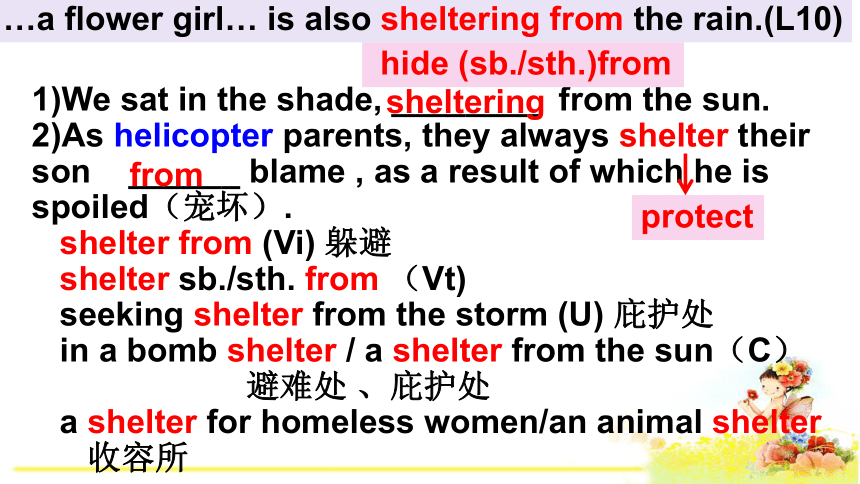
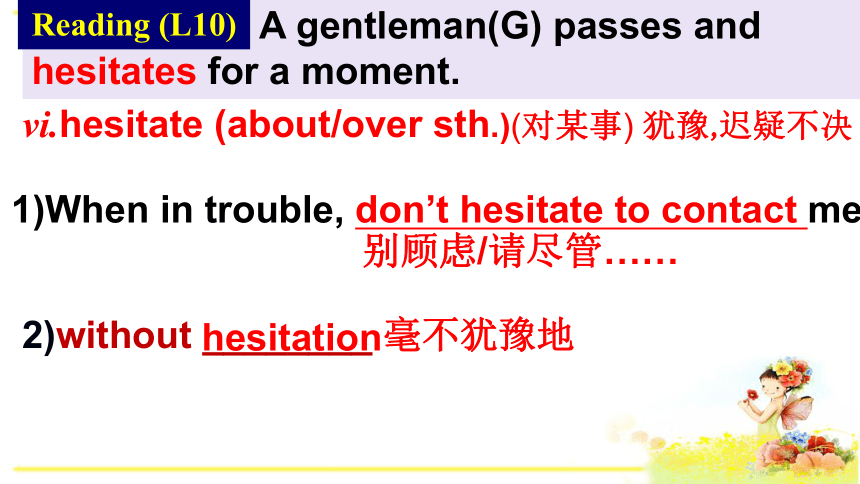
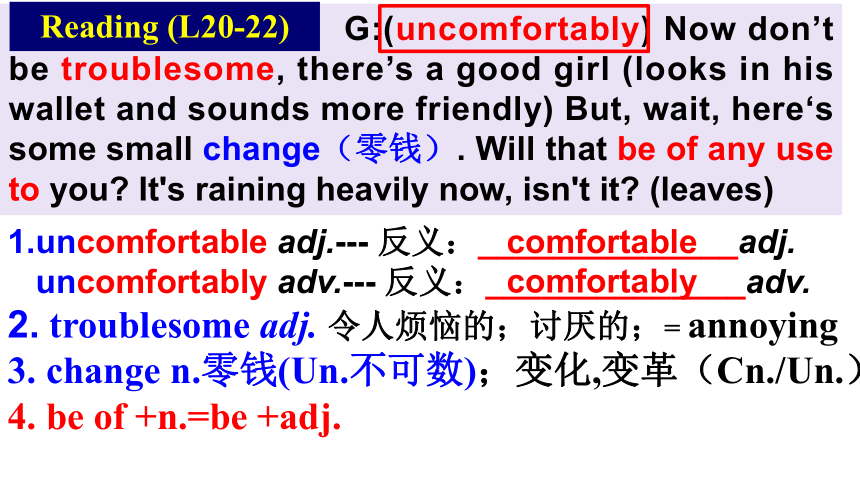
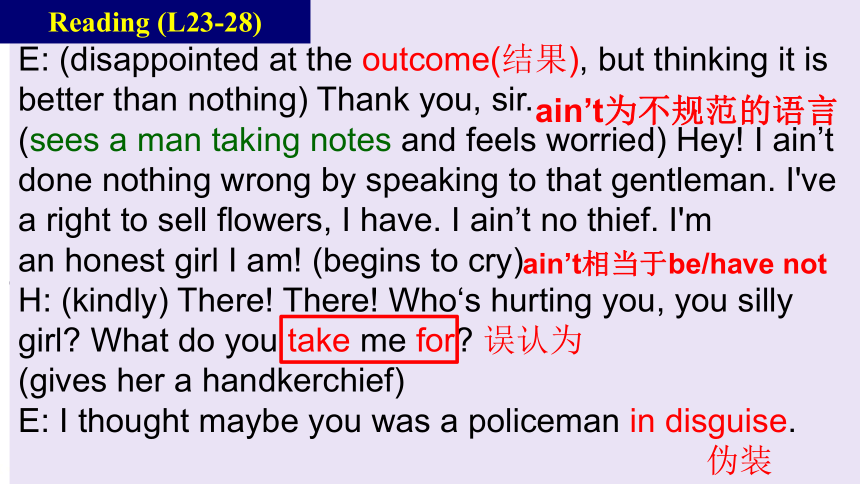
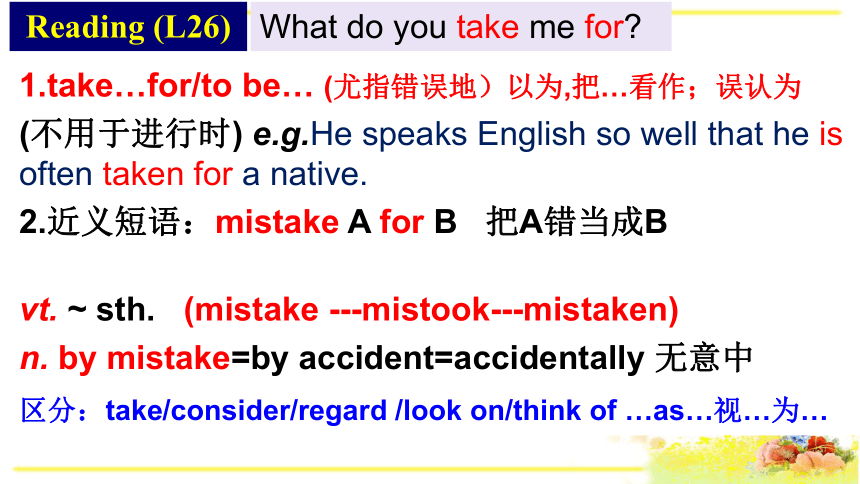
文档简介
(共31张PPT)
Language focus
注意:课文中Eliza的语言不规范。
(对话中多次出现这种不规范的语言是为了突出卖花女Eliza的乡下背景和没受过教育的下等人身份。)
Unit4 Pygmalion
根据汉语意思补全短语
1.hide/shelter ________ the rain避雨
2._______ a moment一会儿;片刻
3.______ disguise伪装(的);假扮(的)
4.pass... _______ as ... (把某人)改变或冒充成……
from
for
in
off
5.make one’s ________________ 结识;与……相见
6._____________ speaking一般来说
7.______ terms ______ ... 就……来说;从……角度
8.be superior ______ 比……优秀/好
9.a ___________ of一把;少量的
10.hand ________ 交出,移交
acquaintance
generally
in
of
to
handful
over
“This play by George Bernard Shaw is an adaptation of a classic Greek story.” n. 改编本 adj.经典的
Warming-up P28
adaptation n. [C]?改编本;[U]?适应 make an~ to sth.
---______v.(使)sb.适应(新情况)
adapt
The film was adapted from a novel,which told that a couple adopted a flexible way to bring up their adopted son,who gradually adapted to his new family.
adapt : v. (使)适应;(使)适合;改编,修改
adopt: vt. 采用,采纳;收养
Professor Higgins(H):(is)an expert in phonetics, (and is) convinced that the quality of a person’s English decides his/her position in society (冒号后的语言有省略)
Reading (L3)
(1)vt. convince sb./yourself (of sth)使确信;使信服?
(2)vt. convince sb. to do sth.=to persuade sb. to do sth
e.g. Although our ideas differed in this matter at first, he convinced me of his opinion and even convinced me to support him in his election.
_____ that the government can lead them out of the financial crisis(金融危机), people are optimistic about the future of the country.
A. Convincing B. Convinced
C. Believed D. Considered
B
提示: sb. convince sb. that-从句/~sb. of sth.
sb. believe sth./that-从句。 非谓语动词作状语时,判断主被动的时候应看其与句子主语的关系。
It’s pouring with rain and cab whistles(汽笛声)are blowing in all directions. A man is hiding from the rain listening to people’s language and watching their reactions. While watching, he makes notes. Nearby a flower girl wearing dark garments(外套) and a woolen scarf is also sheltering from the rain. A gentleman(G) passes and hesitates for a moment.
Reading (L6-10)
1)We sat in the shade, ________ from the sun.
2)As helicopter parents, they always shelter their son ______ blame , as a result of which he is spoiled(宠坏).
shelter from (Vi) 躲避
shelter sb./sth. from (Vt)
seeking shelter from the storm (U) 庇护处
in a bomb shelter / a shelter from the sun(C)
避难处 、庇护处
a shelter for homeless women/an animal shelter
收容所
sheltering
from
hide (sb./sth.)from
protect
…a flower girl… is also sheltering from the rain.(L10)
vi.hesitate (about/over sth.)(对某事) 犹豫,迟疑不决
?
1)When in trouble, don’t hesitate to contact me.
别顾虑/请尽管……
2)without ________ 毫不犹豫地
hesitation
A gentleman(G) passes and hesitates for a moment.
Reading (L10)
1.uncomfortable adj.--- 反义:______________adj.
uncomfortably adv.--- 反义:______________adv.
2. troublesome adj. 令人烦恼的;讨厌的;= annoying
3. change n.零钱(Un.不可数);变化,变革(Cn./Un.)
4. be of +n.=be +adj.
G:(uncomfortably) Now don’t be troublesome, there’s a good girl (looks in his wallet and sounds more friendly) But, wait, here‘s some small change(零钱). Will that be of any use to you? It's raining heavily now, isn't it? (leaves)
Reading (L20-22)
comfortable
comfortably
uncomfortably: in a way that makes you feel anxious or
embarrassed; in a way that shows you are anxious or embarrassed
令人不安(或尴尬)地;显得不安(或尴尬)地?
I became uncomfortably aware that no one else was laughing.
uncomfortable adj.--- 反义:______________adj.
uncomfortably adv.--- 反义:______________adv.
E: (disappointed at the outcome(结果), but thinking it is better than nothing) Thank you, sir.
(sees a man taking notes and feels worried) Hey! I ain’t done nothing wrong by speaking to that gentleman. I've a right to sell flowers, I have. I ain’t no thief. I'm
an honest girl I am! (begins to cry)
H: (kindly) There! There! Who‘s hurting you, you silly girl? What do you take me for? 误认为
(gives her a handkerchief)
E: I thought maybe you was a policeman in disguise.
伪装
Reading (L23-28)
ain’t为不规范的语言
ain’t相当于be/have not
1.take…for/to be… (尤指错误地)以为,把…看作;误认为
(不用于进行时)?e.g.He speaks English so well that he is often taken for a native.
2.近义短语:mistake A for B 把A错当成B
区分:take/consider/regard /look on/think of …as…视…为…
What do you take me for?
Reading (L26)
vt. ~ sth. (mistake ---mistook---mistaken)
n. by mistake=by accident=accidentally?无意中
E: (looking confused) What if I was? What's
it to you?
CP: (has been watching the girl and now
speaks to Higgins) That's quite brilliant!
(L36-38, P29)
“What if...”表“如果……会怎么样?”,常用在口语中,相当于“What will/would happen if...?”。
adj. very intelligent or skillful
1).What if you were defeated by someone who
was not as brilliant(clever/excellent) as you?
2).How/What about (beginning with) the
alphabet? (Page 35)
3).—We have no opportunity to take the trip to
America.
—So what?I don’t care.
4).—Could you lend me some money?
—What for?
那又如何?
有何用?
......怎么样?
H: Simply phonetics studied and classified
from people's own speech. That's my
profession and also my hobby. You can
place a man by just a few remarks.
(L39-40, P29)
对人的发音进行研究,分类,如此而已。这是我的专业,也是我的业余爱好。你可以根据别人的几句话判断他是哪里的人。
classify vt. 编排;分类;归类 classification n.
常用搭配
(1)classify sth./sb. as... 归类为…
(2)classify sth./sb. into... 分成…
(3)classify sth./sb. by/according to按照…分类
remark vt./vi/n 谈论,评论
remarkable adj. _______________________
____________ adv. 非凡地;引人注目地
非凡的;奇异的;显著的
remarkably
H: ...People begin their working life in a poor
neighbourhood of London with 80 pounds a
year and end in a rich one with 100 thousand.
But they betray(暴露本来面目)themselves every time they open their mouths. (L43-45, P29)
人们从伦敦的穷人区开始工作,年收入才80英镑,最后到了富人区工作,年收入就是十万英镑了。但每次他们一张嘴,就会暴露自己的身份。
复习:
end (up) in +抽象名词: 以...结束
end (up) with +具体名词: 以...结束
end up doing sth. 结束做某事(即不再做某事)
Ex. 1). Our class ended ______ a song.
2). Their plan finally ended _____ failure.
3). As long as you study hard, you will end up ________(fail) the exam .
in
with
failing
H: ...Now once (_______) taught by me,
she’d become an upper class lady ...(委婉语气)
CP: Is that so? Extraordinary!(L45-47, P29)
状语从句的省略:在以if, unless, once, when, while, though, although等引导的状语从句中, 如从句的主语与主句主语一致且从句谓语含有be动词,或从句中主谓结构为 it is (was)+ adj,从句结构可省略为以上连词+v-ed, v-ing 或adj。
adj. unusual or surprising
she was
Ex. COVID-19 is a disease that can contribute to people's death if left ________.
A. being untreated B. not treating
C. untreated D. not having treated
C
解析:...if left untreated. 是状语从句的省略,
其完整表达为:if it is left untreated.
leave sth. done sth. be left done
解析:...if left untreated. 是状语从句的省略,
其完整表达为:if it is left untreated.
leave sth. done sth. be left done
H: (rudely) Look at this girl with her terrible
English: the English that will condemn her to
the gutter to the end of her days. (L48-50, P30)
(粗鲁地)你瞧那个姑娘,英语说得那么糟糕,命中注定要在贫民窟中度过一辈子了。
condemn vt.判刑,谴责,使…注定
condemn sb.to (do) sth.使某人注定做某事,
判处某人做某事
H: But, sir, (proudly) once (________)
educated to speak properly, that girl could
pass herself off in three months as a duchess
at an ambassador's garden party. (L50-52, P30)
但是,先生,(傲慢地)要是有人教她把英语说好了,那个女孩在三个月后就可以冒充公爵夫人出现在大使的花园聚会上。
she was
pass sb. off as... (把某人) 改变或冒充为...
(Line60-61) H: I'm Henry Higgins and I was
going to India to meet you.
CP: And I came to England to make your
acquaintance!
make one's acquaintance
make the acquaintance of sb
结识某人
acquaintance Un. 熟悉,认识
Cn. 熟悉的人
(Line65) E: (looking at the collected money in amazement) Well, I never. A whole pound! A fortune! That'll help me, indeed it will.
in amazement: in great surprise惊愕地;吃惊地
?Tom is often . Last year he went to Beijing to try his (碰运气; 找出路).
, he met and married his girlfriend there. (fortune)
fortunate
fortune
Fortunately
(P31: E5) Correct all these sentences in terms of grammar, spelling, etc, so that she can use them properly(合理地).
Translate:
One’s success cannot always be measured
___________________________________.
一个人的成功不能总是从社会地位和钱的角度来衡量。
就...而言;在...方面
in terms of social status or money
(P32: E1) someone who steals sth or rob sb
n.抢劫者; 盗贼 n.抢劫; 盗窃
robber
robbery
短语辨析: 抢劫某人/某地某物
偷某人的东西
rob sb./sp. of sth
steal (sth) from sb
vt.抢劫
He knocked the driver down and robbed him of his money.
They robbed the people of their liberty.
他们剥夺了人民的自由。
.
(P32: E2) Higgins thought that a (较高的,优秀的) social position was once more dependent on grammar ... Actually his view was only accepted by a handful of his followers.
superior
少量的,少数的 handful n.一把;少量
1.Tom is superior to Mike in terms of competence (能力). →Tom is better than Mike...
2.I’ll complain to your superiors.
n.上级,上司 a person of higher rank or status
《新课程P72》Grammar:过去分词作状语
过去分词作状语,修饰谓语动词,进一步说明谓语动词的动作和状态,即动作发生时的背景或状况,其逻辑主语通常是句子的主语,且与主语之间为动宾关系。
(see) from the top of the hill, the park looks more beautiful.
(give) more attention, the trees could have grown better.
He hurried to the hall, (followed) by two guards.
Seen
Given
followed
过去分词短语作条件、原因以及时间状语时,通常放在句首;作伴随、结果状语时,放句末;作方式状语时,一般位于句末,也可位于句首;作让步状语时,一般位于句首,有时也放在句末。
①(2017·北京卷改编)Already this year, 115 measles(麻疹) cases have been reported in the USA, __________(compare)with/to 189 for all of last year.
②(2018·北京卷改编) __________(determine) to be myself, move forward, free of shame and worldly labels, I can now call myself a “marathon winner”.
Determined
compared
请同学们下载观看微课进一步学习“过去分词作状语”!
THANK YOU!
Language focus
注意:课文中Eliza的语言不规范。
(对话中多次出现这种不规范的语言是为了突出卖花女Eliza的乡下背景和没受过教育的下等人身份。)
Unit4 Pygmalion
根据汉语意思补全短语
1.hide/shelter ________ the rain避雨
2._______ a moment一会儿;片刻
3.______ disguise伪装(的);假扮(的)
4.pass... _______ as ... (把某人)改变或冒充成……
from
for
in
off
5.make one’s ________________ 结识;与……相见
6._____________ speaking一般来说
7.______ terms ______ ... 就……来说;从……角度
8.be superior ______ 比……优秀/好
9.a ___________ of一把;少量的
10.hand ________ 交出,移交
acquaintance
generally
in
of
to
handful
over
“This play by George Bernard Shaw is an adaptation of a classic Greek story.” n. 改编本 adj.经典的
Warming-up P28
adaptation n. [C]?改编本;[U]?适应 make an~ to sth.
---______v.(使)sb.适应(新情况)
adapt
The film was adapted from a novel,which told that a couple adopted a flexible way to bring up their adopted son,who gradually adapted to his new family.
adapt : v. (使)适应;(使)适合;改编,修改
adopt: vt. 采用,采纳;收养
Professor Higgins(H):(is)an expert in phonetics, (and is) convinced that the quality of a person’s English decides his/her position in society (冒号后的语言有省略)
Reading (L3)
(1)vt. convince sb./yourself (of sth)使确信;使信服?
(2)vt. convince sb. to do sth.=to persuade sb. to do sth
e.g. Although our ideas differed in this matter at first, he convinced me of his opinion and even convinced me to support him in his election.
_____ that the government can lead them out of the financial crisis(金融危机), people are optimistic about the future of the country.
A. Convincing B. Convinced
C. Believed D. Considered
B
提示: sb. convince sb. that-从句/~sb. of sth.
sb. believe sth./that-从句。 非谓语动词作状语时,判断主被动的时候应看其与句子主语的关系。
It’s pouring with rain and cab whistles(汽笛声)are blowing in all directions. A man is hiding from the rain listening to people’s language and watching their reactions. While watching, he makes notes. Nearby a flower girl wearing dark garments(外套) and a woolen scarf is also sheltering from the rain. A gentleman(G) passes and hesitates for a moment.
Reading (L6-10)
1)We sat in the shade, ________ from the sun.
2)As helicopter parents, they always shelter their son ______ blame , as a result of which he is spoiled(宠坏).
shelter from (Vi) 躲避
shelter sb./sth. from (Vt)
seeking shelter from the storm (U) 庇护处
in a bomb shelter / a shelter from the sun(C)
避难处 、庇护处
a shelter for homeless women/an animal shelter
收容所
sheltering
from
hide (sb./sth.)from
protect
…a flower girl… is also sheltering from the rain.(L10)
vi.hesitate (about/over sth.)(对某事) 犹豫,迟疑不决
?
1)When in trouble, don’t hesitate to contact me.
别顾虑/请尽管……
2)without ________ 毫不犹豫地
hesitation
A gentleman(G) passes and hesitates for a moment.
Reading (L10)
1.uncomfortable adj.--- 反义:______________adj.
uncomfortably adv.--- 反义:______________adv.
2. troublesome adj. 令人烦恼的;讨厌的;= annoying
3. change n.零钱(Un.不可数);变化,变革(Cn./Un.)
4. be of +n.=be +adj.
G:(uncomfortably) Now don’t be troublesome, there’s a good girl (looks in his wallet and sounds more friendly) But, wait, here‘s some small change(零钱). Will that be of any use to you? It's raining heavily now, isn't it? (leaves)
Reading (L20-22)
comfortable
comfortably
uncomfortably: in a way that makes you feel anxious or
embarrassed; in a way that shows you are anxious or embarrassed
令人不安(或尴尬)地;显得不安(或尴尬)地?
I became uncomfortably aware that no one else was laughing.
uncomfortable adj.--- 反义:______________adj.
uncomfortably adv.--- 反义:______________adv.
E: (disappointed at the outcome(结果), but thinking it is better than nothing) Thank you, sir.
(sees a man taking notes and feels worried) Hey! I ain’t done nothing wrong by speaking to that gentleman. I've a right to sell flowers, I have. I ain’t no thief. I'm
an honest girl I am! (begins to cry)
H: (kindly) There! There! Who‘s hurting you, you silly girl? What do you take me for? 误认为
(gives her a handkerchief)
E: I thought maybe you was a policeman in disguise.
伪装
Reading (L23-28)
ain’t为不规范的语言
ain’t相当于be/have not
1.take…for/to be… (尤指错误地)以为,把…看作;误认为
(不用于进行时)?e.g.He speaks English so well that he is often taken for a native.
2.近义短语:mistake A for B 把A错当成B
区分:take/consider/regard /look on/think of …as…视…为…
What do you take me for?
Reading (L26)
vt. ~ sth. (mistake ---mistook---mistaken)
n. by mistake=by accident=accidentally?无意中
E: (looking confused) What if I was? What's
it to you?
CP: (has been watching the girl and now
speaks to Higgins) That's quite brilliant!
(L36-38, P29)
“What if...”表“如果……会怎么样?”,常用在口语中,相当于“What will/would happen if...?”。
adj. very intelligent or skillful
1).What if you were defeated by someone who
was not as brilliant(clever/excellent) as you?
2).How/What about (beginning with) the
alphabet? (Page 35)
3).—We have no opportunity to take the trip to
America.
—So what?I don’t care.
4).—Could you lend me some money?
—What for?
那又如何?
有何用?
......怎么样?
H: Simply phonetics studied and classified
from people's own speech. That's my
profession and also my hobby. You can
place a man by just a few remarks.
(L39-40, P29)
对人的发音进行研究,分类,如此而已。这是我的专业,也是我的业余爱好。你可以根据别人的几句话判断他是哪里的人。
classify vt. 编排;分类;归类 classification n.
常用搭配
(1)classify sth./sb. as... 归类为…
(2)classify sth./sb. into... 分成…
(3)classify sth./sb. by/according to按照…分类
remark vt./vi/n 谈论,评论
remarkable adj. _______________________
____________ adv. 非凡地;引人注目地
非凡的;奇异的;显著的
remarkably
H: ...People begin their working life in a poor
neighbourhood of London with 80 pounds a
year and end in a rich one with 100 thousand.
But they betray(暴露本来面目)themselves every time they open their mouths. (L43-45, P29)
人们从伦敦的穷人区开始工作,年收入才80英镑,最后到了富人区工作,年收入就是十万英镑了。但每次他们一张嘴,就会暴露自己的身份。
复习:
end (up) in +抽象名词: 以...结束
end (up) with +具体名词: 以...结束
end up doing sth. 结束做某事(即不再做某事)
Ex. 1). Our class ended ______ a song.
2). Their plan finally ended _____ failure.
3). As long as you study hard, you will end up ________(fail) the exam .
in
with
failing
H: ...Now once (_______) taught by me,
she’d become an upper class lady ...(委婉语气)
CP: Is that so? Extraordinary!(L45-47, P29)
状语从句的省略:在以if, unless, once, when, while, though, although等引导的状语从句中, 如从句的主语与主句主语一致且从句谓语含有be动词,或从句中主谓结构为 it is (was)+ adj,从句结构可省略为以上连词+v-ed, v-ing 或adj。
adj. unusual or surprising
she was
Ex. COVID-19 is a disease that can contribute to people's death if left ________.
A. being untreated B. not treating
C. untreated D. not having treated
C
解析:...if left untreated. 是状语从句的省略,
其完整表达为:if it is left untreated.
leave sth. done sth. be left done
解析:...if left untreated. 是状语从句的省略,
其完整表达为:if it is left untreated.
leave sth. done sth. be left done
H: (rudely) Look at this girl with her terrible
English: the English that will condemn her to
the gutter to the end of her days. (L48-50, P30)
(粗鲁地)你瞧那个姑娘,英语说得那么糟糕,命中注定要在贫民窟中度过一辈子了。
condemn vt.判刑,谴责,使…注定
condemn sb.to (do) sth.使某人注定做某事,
判处某人做某事
H: But, sir, (proudly) once (________)
educated to speak properly, that girl could
pass herself off in three months as a duchess
at an ambassador's garden party. (L50-52, P30)
但是,先生,(傲慢地)要是有人教她把英语说好了,那个女孩在三个月后就可以冒充公爵夫人出现在大使的花园聚会上。
she was
pass sb. off as... (把某人) 改变或冒充为...
(Line60-61) H: I'm Henry Higgins and I was
going to India to meet you.
CP: And I came to England to make your
acquaintance!
make one's acquaintance
make the acquaintance of sb
结识某人
acquaintance Un. 熟悉,认识
Cn. 熟悉的人
(Line65) E: (looking at the collected money in amazement) Well, I never. A whole pound! A fortune! That'll help me, indeed it will.
in amazement: in great surprise惊愕地;吃惊地
?Tom is often . Last year he went to Beijing to try his (碰运气; 找出路).
, he met and married his girlfriend there. (fortune)
fortunate
fortune
Fortunately
(P31: E5) Correct all these sentences in terms of grammar, spelling, etc, so that she can use them properly(合理地).
Translate:
One’s success cannot always be measured
___________________________________.
一个人的成功不能总是从社会地位和钱的角度来衡量。
就...而言;在...方面
in terms of social status or money
(P32: E1) someone who steals sth or rob sb
n.抢劫者; 盗贼 n.抢劫; 盗窃
robber
robbery
短语辨析: 抢劫某人/某地某物
偷某人的东西
rob sb./sp. of sth
steal (sth) from sb
vt.抢劫
He knocked the driver down and robbed him of his money.
They robbed the people of their liberty.
他们剥夺了人民的自由。
.
(P32: E2) Higgins thought that a (较高的,优秀的) social position was once more dependent on grammar ... Actually his view was only accepted by a handful of his followers.
superior
少量的,少数的 handful n.一把;少量
1.Tom is superior to Mike in terms of competence (能力). →Tom is better than Mike...
2.I’ll complain to your superiors.
n.上级,上司 a person of higher rank or status
《新课程P72》Grammar:过去分词作状语
过去分词作状语,修饰谓语动词,进一步说明谓语动词的动作和状态,即动作发生时的背景或状况,其逻辑主语通常是句子的主语,且与主语之间为动宾关系。
(see) from the top of the hill, the park looks more beautiful.
(give) more attention, the trees could have grown better.
He hurried to the hall, (followed) by two guards.
Seen
Given
followed
过去分词短语作条件、原因以及时间状语时,通常放在句首;作伴随、结果状语时,放句末;作方式状语时,一般位于句末,也可位于句首;作让步状语时,一般位于句首,有时也放在句末。
①(2017·北京卷改编)Already this year, 115 measles(麻疹) cases have been reported in the USA, __________(compare)with/to 189 for all of last year.
②(2018·北京卷改编) __________(determine) to be myself, move forward, free of shame and worldly labels, I can now call myself a “marathon winner”.
Determined
compared
请同学们下载观看微课进一步学习“过去分词作状语”!
THANK YOU!
